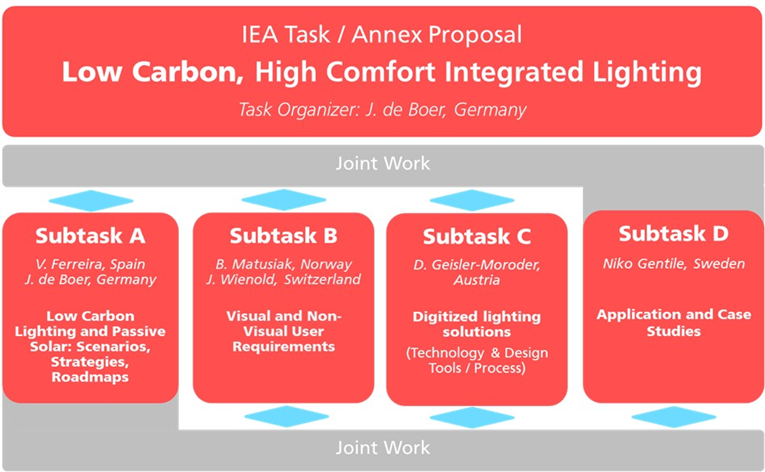IEA SHC Task 70: Low Carbon, High Comfort Integrated Lighting
Short Description
Motivation
Lighting accounts for 5% of the global CO2 emissions. In addition to its carbon footprint and impact on global warming, lighting with 15% of the electrical energy consumption is in strong competition with other existing or new consumers (e-mobility, heat pump systems, etc.). More directly taxed CO2 emissions, rising electricity prices up to power shortages are concomitant phenomena. Aside the direct impact on the consumption of electric lighting, daylighting in tradeoff with solar gains can have positive or negative impacts on heating and cooling loads in today's highly engineered buildings. Moreover, embodied energy for electric and daylighting technology has to be taken into account - playing a growing role on a relative scale. Thus, widening the rating perspective of lighting solutions to a more holistic view of its impact on CO2 emissions, encompassing the whole life cycle (the lighting value chain) also in context of regional energy markets aspects, interaction with other building trades etc. is urgently deemed necessary.
Scope and Goals
IEA SHC Task 70 deals with general lighting systems for indoor environments and the impact of buildings (especially their facades) on the built/urban environment, with a focus on non-residential buildings. Specifically, the project addresses the integration of
- daylight harvesting through improved façade technologies and architectural solutions with
- concepts for artificial lighting solutions considering technology and design approaches in the context of advancing digitalization, and
- lighting control systems and strategies focusing on the interface of daylighting and artificial lighting.
All of this will be considered under the broad objective of decarbonization and sustainability of buildings in an LCA / circular economy context and with special attention to the visual and non-visual user requirements. The task is thus addressed to planners and consultants in the building sector (lighting / energy / HVAC), the relevant industry (facades, electric lighting, lighting and building control, software companies), owners/investors and public authorities. For them, strategic, technical and economic information is provided, and networking activities are offered. This is a step towards overcoming barriers in identifying and subsequently implementing CO2-neutral lighting concepts and systems and thus broadening the previous purely energy-based focus to a life-cycle perspective.
Austria is represented in Task 70 by the University of Innsbruck, Unit of Energy Efficient Building, Bartenbach GmbH, and HELLA Sonnen- und Wetterschutztechnik GmbH, and participates in all four Subtasks. The focus of the Austrian participation is on Subtask C "Digitized lighting solutions (Technology & Design Tools / Process)", which will also be coordinated.
Expected Results
Key results from the Task will be publicly available in summary reports via the program website:
- Low Carbon Lighting: Scenarios, Strategies and Roadmaps
- Visual and Non-Visual User Requirements
- Digitalized Lighting Solutions for low carbon build environments – Status quo and outlook
- Low carbon daylighting and lighting solutions: practical applications
In addition, a white paper on the current state-of-the-art of lighting simulation software tools for visual and non-visual performance evaluation is planned as part of Subtask C. In parallel to the face-to-face project meetings, industry workshops will be organized to ensure the transfer of know-how between the task experts and the relevant stakeholders. Within the Solar Academy, a webinar focusing on "Low Tech, High Impact Lighting solutions for sunbelt regions" is planned. Moreover, a special issue in a relevant scientific journal will ensure dissemination in the academic community.
Participants
Australia, Austria, Belgium, Brazil, Canada, China, Denmark, Germany (Operating Agent), Italy, Japan, Norway, Poland, Spain, Sweden, Switzerland, Turkey, United Kingdom, USA.
Contact Address
Project leader
Universität Innsbruck
Institut für Konstruktion und Materialwissenschaften
Arbeitsbereich Energieeffizientes Bauen
Dr. David Geisler-Moroder
assoz. Prof. Dr.-Ing. Rainer Pfluger
Technikerstraße 13, 6020 Innsbruck
E-Mail: david.geisler-moroder@uibk.ac.at, rainer.pfluger@uibk.ac.at
Project partners
Mag. Robert Weitlaner, MSc
E-Mail: robert.weitlaner@hella.info
HELLA Sonnen- und Wetterschutztechnik GmbH
9913 Abfaltersbach, Nr. 125
Dipl.-Ing. Johannes Weninger
E-Mail: johannes.weninger@bartenbach.com
Bartenbach GmbH
Rinner Straße 14, 6071 Aldrans

